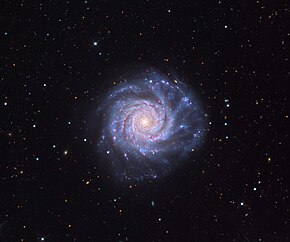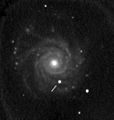NGC 3938
 From Wikipedia the free encyclopedia
From Wikipedia the free encyclopedia
| NGC 3938 | |
|---|---|
 | |
| Observation data (J2000 epoch) | |
| Constellation | Ursa Major[1] |
| Right ascension | 11h 52m 42.9s[1] |
| Declination | +44° 07′ 17″[1] |
| Distance | 43 Mly |
| Apparent magnitude (V) | 10.9[1] |
| Characteristics | |
| Type | SA(s)c[2] |
| Apparent size (V) | 5.4′ × 4.9′[1] |
| Other designations | |
| UGC 6856, MCG +07-25-001, PGC 37229[2] | |
NGC 3938 is an unbarred spiral galaxy in the Ursa Major constellation. It was discovered on 6 February 1788 by William Herschel. It is one of the brightest spiral galaxies in the Ursa Major South galaxy group and is roughly 67,000 light years in diameter.[3] It is approximately 43 million light years away from Earth.[1] NGC 3938 is classified as type Sc under the Hubble sequence, a loosely wound spiral galaxy with a smaller and dimmer bulge.[4] The spiral arms of the galaxy contain many areas of ionized atomic hydrogen gas, more so towards the center.[5]
Supernovae
[edit]Five supernovae have been identified within NGC 3938. SN 1961U (mag. 13.7) was discovered on 2 January 1962.[6] SN 1964L (mag. 13.3) was discovered on 11 December 1964.[7] SN 2005ay is a type II supernova that was discovered on 27 March 2005 and had a magnitude of 15.6.[8] SN 2017ein is a type Ic supernova that was discovered on 25 May 2017 and peaked at magnitude 14.9.[9] Images taken before the explosion point to a progenitor mass between ~47-48M☉, if it was in a single star system, and ~60-80M☉, if it was in a binary star system.[10] SN 2022xlp is a type Ia supernova that was discovered on 13 October 2022 by Kōichi Itagaki.
Gallery
[edit]- Artist's impression of progenitor star to a type Ic supernova in NGC 3938.[11]
- Spiral galaxy NGC 3938, by HST. Location of SN 2005ay remnant is marked.
- NGC 3938 with supernova SN 2005ay
- The location of SN 2017ein, by HST.
- NGC 3938 by the Sloan Digital Sky Survey
References
[edit]- ^ a b c d e f George Normandin (5 May 2005). "Spiral Galaxy NGC 3839". kopernik.org. Retrieved 30 December 2011.
- ^ a b "Results for object NGC 3938 (NGC 3938)". NASA/IPAC Extragalactic Database. California Institute of Technology. Retrieved 28 February 2021.
- ^ "The Ursa Major Groups". Atlas of the Universe. Retrieved 30 December 2011.
- ^ van der Kruit, P.C.; Shostak, G.S. (1982). "Studies of Nearly Face-on Spiral Galaxies" (PDF). Astronomy and Astrophysics. 105: 351–358. Bibcode:1982A&A...105..351V. Retrieved 25 June 2014.
- ^ Jiménez-Vicente, J.; E. Battaner; M. Rozas; H. Castañeda; et al. (1999). "Fabry-Perot observations of the ionized gas in NGC 3938" (PDF). Astronomy and Astrophysics. 342: 417–425. arXiv:astro-ph/9811391. Bibcode:1999A&A...342..417J.
- ^ Transient Name Server entry for SN 1961U. Retrieved 25 March 2023.
- ^ Transient Name Server entry for SN 1964L. Retrieved 25 March 2023.
- ^ "Supernova 2005ay in NGC 3938". Rochester Astronomy. Retrieved 29 January 2013.
- ^ "Supernovae 2017ein in NGC 3938". www.rochesterastronomy.org. Retrieved 29 June 2017.
- ^ Van Dyk, Schuyler; et al. (15 July 2018). "SN 2017ein and the Possible First Identification of a Type Ic Supernova Progenitor". The Astrophysical Journal. 860 (2): 90. arXiv:1803.01050. Bibcode:2018ApJ...860...90V. doi:10.3847/1538-4357/aac32c. hdl:10150/628570. S2CID 56265423.
- ^ "Artist's impression of progenitor star to a type Ic supernova". www.spacetelescope.org. Retrieved 20 November 2018.
External links
[edit] Media related to NGC 3938 at Wikimedia Commons
Media related to NGC 3938 at Wikimedia Commons
![Artist's impression of progenitor star to a type Ic supernova in NGC 3938.[11]](http://upload.wikimedia.org/wikipedia/commons/thumb/6/60/Artist%27s_impression_of_progenitor_star_to_a_type_Ic_supernova.jpg/120px-Artist%27s_impression_of_progenitor_star_to_a_type_Ic_supernova.jpg)



